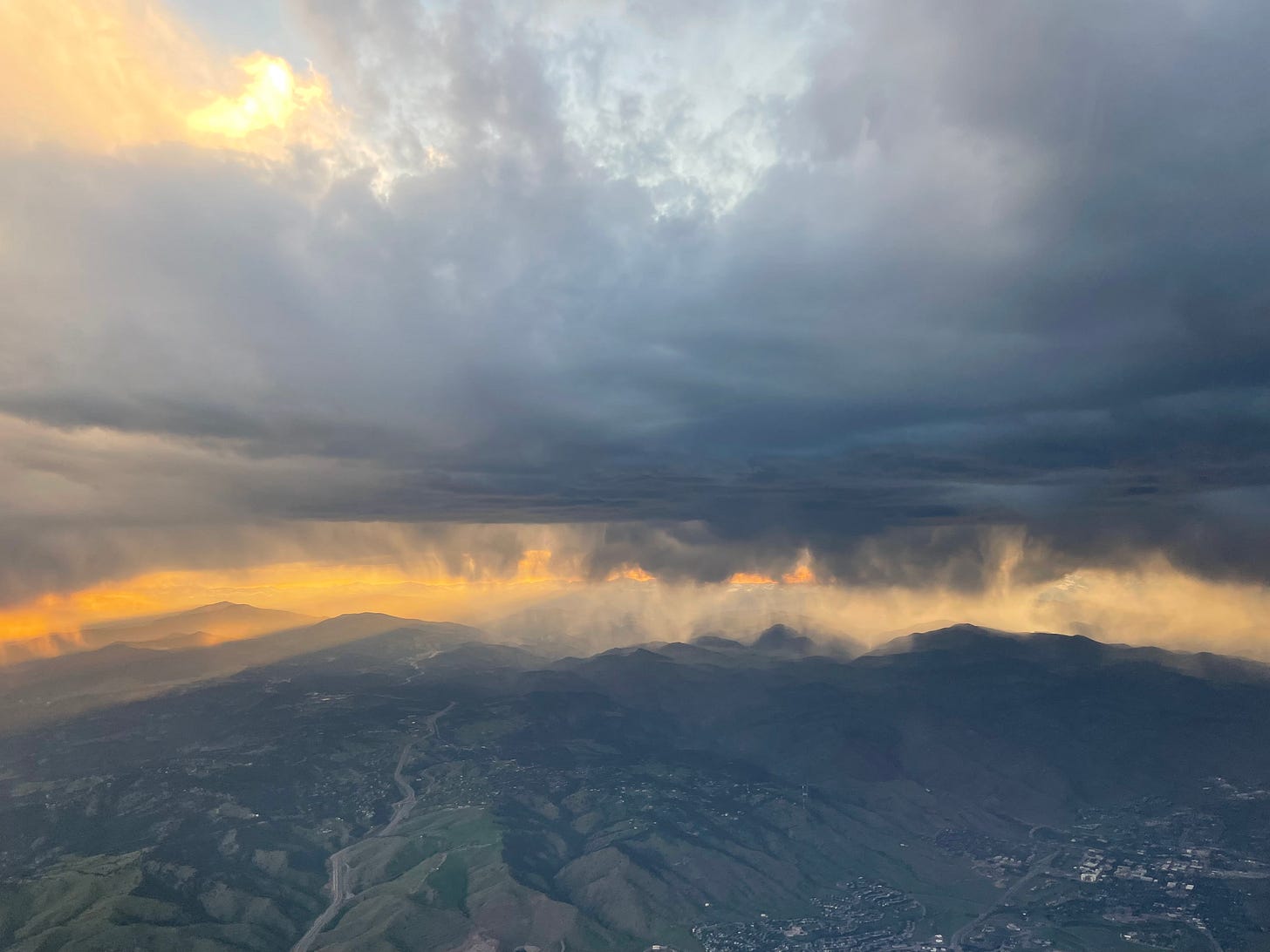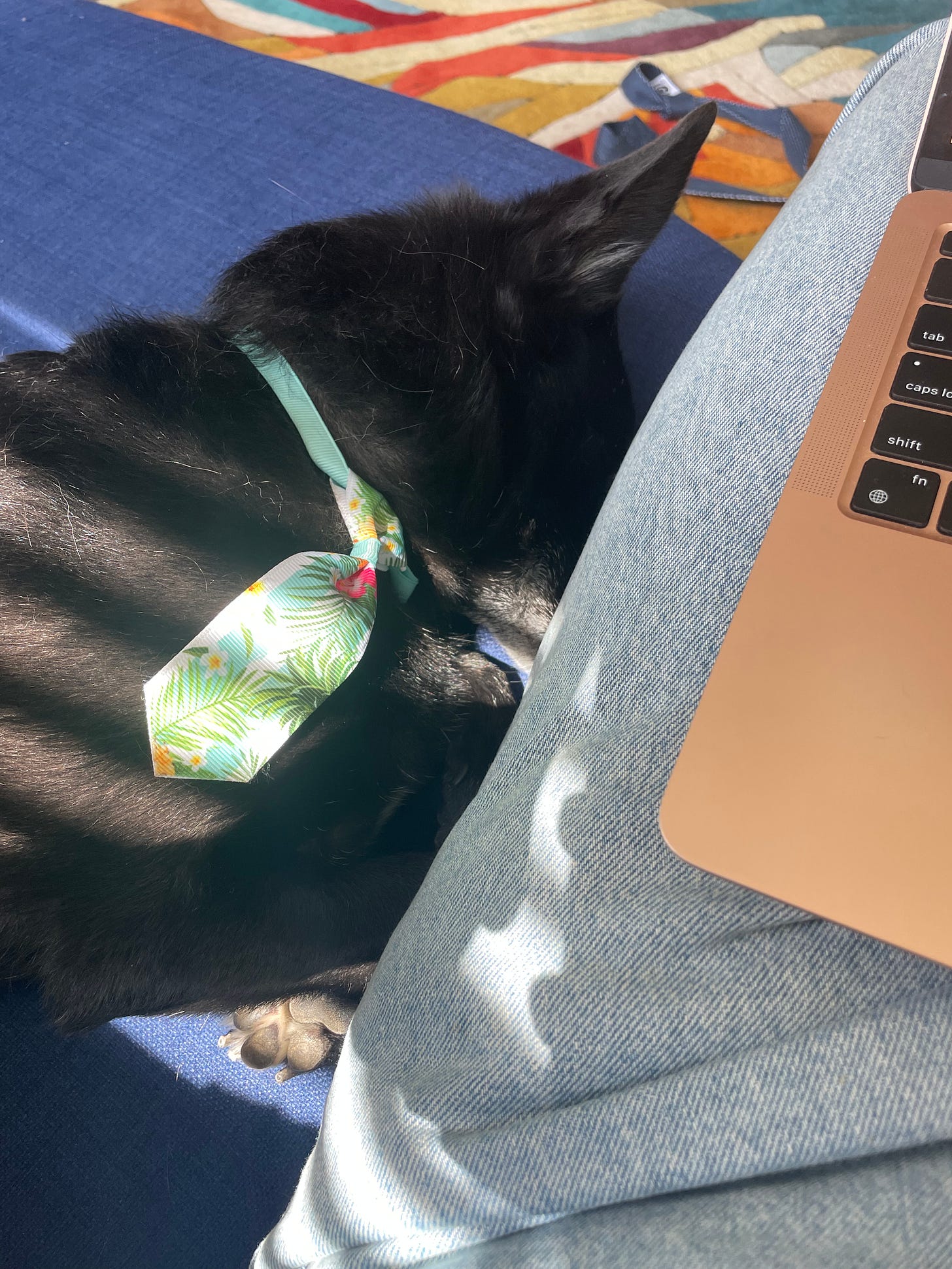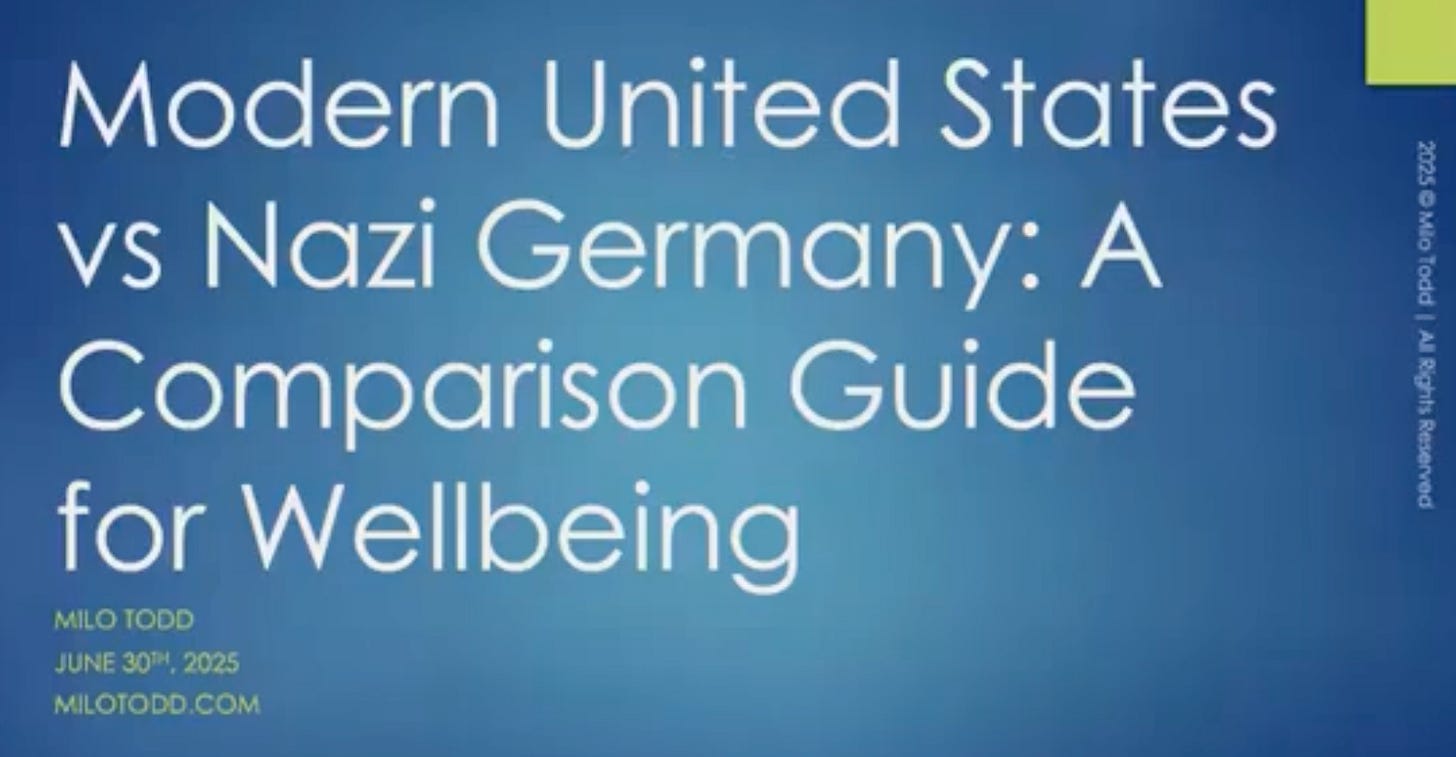Making the Case for Hope
A compilation of all the evidence, perspectives, and thoughts I have about where to find hope right now.
As the people in my life learn about my work, I find myself being asked a similar thread of questions with striking regularity:
How do you do it? How do you stay hopeful? Do you really think we can survive this?
Sometimes the questions aren't questions. Sometimes, I just hear the undercurrent of doom in the way a friend is speaking and feel pulled to try to share another way.
However it is I get there, I find myself repeatedly in conversations where I'm making the case for hope. I decided I'd dedicate a full newsletter today to just that: all the evidence, perspectives, actions, and resources that have me steadfastly hoping for something better, and, dare I say it, actually believing that we can get there.

As with all my articles, this piece is 100% human-generated. Just me and my little tablet, sitting next to a tree in the library (and eventually next to a tree outside the library), pouring out my heart to convince you a better world is out there. (For more detail on GQN's AI policy, click here!)
Defining Hope
Language has power, which means the words we use, especially big ones like Hope, should be selected with precision. Hope is a genuine belief in the possibility of a positive outcome. But hope is not a neutral scoreboard keeping track of whether or not we're winning, it's far messier than that.
As I say often, we don't see the world as it is, we see it as we are. The person you are, the kinds of community support you have, the victories you've been a part of, the stories of change you've learned about, the current state of your overall mental health, and more all factor in to your disposition towards hope.
I am an incredibly hopeful person, thanks to an ever-growing pile of evidence, to the loving community I am surrounded by, to the strength given to me by my jewish heritage and faith, to my role as a community organizer in St. Louis and around the country, and to my relentless pursuit of joy.
Today, I aim to share as much of this hope with you as I possibly can. Feel free to share this with someone you think could use a little extra hope, too.
Do I really need to hope? Can't I just fight because I'm angry?
I mean, sure, you could, and I'll probably work up a whole piece about this in a few weeks, but for now what I'll say is that anger can only carry you so far.
Rage is a powerful, beautiful emotion that allows us to know when something cannot be accepted. It can motivate us and empower us in many ways, but many of these ways will ultimately focus on the destruction of the systems and powers that have failed us. Hope and joy ask us to imagine what we will build in their stead. We dream of investing in relationships, of empowering our communities, and we start to make these things possible through our belief and our work towards making them real.
We talk about hope because it gives us the strength we need to carry on. There have been a number of times lately we could have given up—and many did. Races that felt hopeless, like in Wisconsin when Elon Musk poured millions into their supreme court election—a critical race. But we didn't give up, we organized and fought like hell, and we won the race. Conversion therapy is now banned thanks to that court, and Elon Musk has been humiliated out of power, reputation, and millions of dollars.
My goal in talking about hope today isn't to give you comfort that someone else is coming to save us. It is to give you the strength to recognize that WE have the ability to save us.
Addressing the Doom in the Room
A few weeks ago, a friend sent me this stellar article tackling head on the "doomer" mentality that many folks had adopted as a badge of honor. I think the whole article is great: Ok, Doomer, but I'll pull out one of my favorite quotes for you here:
The fundamental mistake here (and it’s one I certainly participated in before realizing how harmful it was), is treating depression as a reasonable or even virtuous response to problems, rather than recognizing it as a cognitive distortion that hinders effective action. Depression is characterized by mentally processing ambiguous events with a negative spin. Having experienced it myself, I know that your brain lies to you when you’re depressed—but it feels very real when you’re in it. It feels like you are experiencing the world more clearly than those without depression. And so it is with doomerism.
A resource: If you're a big history fan, or you're feeling particularly frightened about the direction the country is going in, a brilliant author, teacher, and scholar (and a dear friend) has put together an incredibly robust free online course titled: Modern United States vs Nazi Germany: A Comparison Guide for Wellbeing. I am a few sections in so far and have already found it to be tremendously helpful.
A final reminder/reflection question when you start to feel the pull towards doom and paralysis after hours of scrolling or 10 back to back horrifying headlines: who benefits from you feeling this way? Is it the same people who are giving you the information that makes you feel this way? Remember: Your despair is someone else's business model. Who wins when you give up?
Hope Comes from History
I’ve been very publicly out for the last 10 years, and I’ve had the opportunity to see changes far beyond my wildest dreams. Yes, changes in legislation or wins like marriage equality, but also something less tangible, but, I’d argue, more important.
I wrote about this at length in the article celebrating my 100th free PFLAG presentation (I’m now at about 135 morning), but I have been truly altered by the amount of change I’ve been able to witness. The grandparents showing up to learn more. The parents becoming passionate advocates. The social workers coming with questions about supporting their students and clients. The culture feels different. Off social media, outside of blanket assumptions about whole states or small towns, I find the average person to be more willing to ask questions and see me as a human than ever before.
I spent so long with the tiniest scraps of representation in the media, and now I sit in front of a wall of bookshelves of queer literature, including my own book that I published and that sold over 5,000 copies to parents learning to support their trans loved ones. Even in the face of record-high book banning, publication of and support for queer authors, stories, and art—as well as the increases in empathy and allyship that this art inspires—has never been higher.
My hope rooted in my personal history is further compounded by my hope rooted in the history of the queer community. As I’ve written about many times before, so many of the queer folks from generations prior would be truly floored at the progress, safety, access to healthcare, access to family support, and public visibility this community has today. Of course they would want us to keep fighting, but it’s critical to learn our history beyond just saying “Marsha P Johnson threw the first brick at Stonewall, why aren’t we free yet??”
When we learn the stories of ACT UP, when we learn about the public education and research work of the Institute for Sexual Medicine in Germany, when we learn about the queer folks hiding their love behind roommates and best friends, when we learn about the lesbians and queer women who were the only ones willing to take care of folks dying of AIDS, when we learn about the queer activists spreading knowledge and safety through zines and mailing lists, when we learn about Lou Sullivan creating the first transgender men support group, and Marsha P Johnson building a housing and support network for trans women of color, we can feel their hope across timelines.
I am hopeful because I stand on their shoulders, as they stood on the shoulders of the people before them, creating a powerful line of queer and trans changemakers, and I refuse to let their legacy end with me because I decided "we’re cooked" because I saw it in an Instagram reel.
I am hopeful because I learned from them that we know how to survive when our systems fail us. I understand in my bones that we keep us safe, that we do not exist at the pleasure of the federal government. I understand that no matter who tries, and how hard they try, we will always be here.
The Dimmer the Night, the Stronger the Hope
I moved to Missouri in 2020 after spending all my life comfortable in New England. I had largely avoided visiting or even really thinking about red states out of a combination of fear and disdain. Then my wife asked me to move with her to St. Louis for medical school, and I found myself unexpectedly yet completely transformed.
I learned what it meant to love a place that did not love you back. I learned that that meant fighting to make it better, building coalitions to take back our power, understanding that no one is coming to save us and becoming our own superheroes.
In the immediate aftermath of the election, everyone I know living in a blue state, was despondent, petrified, looking for a way out. I spent election night in a hotel ballroom in Missouri amid a flock of community organizers, eagerly awaiting the results of the abortion ballot initiative we have been fighting for. We won on that ballot, but we knew a greater loss was coming. But our sleeves were already rolled. Our hands were already in the dirt. We knew we had the strength to survive, and we knew our only option was to keep fighting as we always have.
I have organized with brilliant leaders from small town towns and rural areas and places that are learning to build their power, locally, and engage people who others would have completely written off.
This spring, we saw the failure of every candidate endorsed by Mom‘s for liberty at a school board election across the state. It has been incredible to see the strength and power in these communities all around the country. How could I look at this and feel anything but hope?
The Pushback is Everywhere... and it's Working
It's been nothing short of remarkable to see the pushback cropping up in every corner of the country, and internationally as well, to the cruelty and hate of the Trump administration.
The biggest, which you've likely heard about, is the fact that the US has seen millions of people, literally, showing up to protest at events like No Kings Day, which might be one of the largest protest days in American History. This, coupled with the sociological statistic that if 3.5% of a population engages in nonviolent protest, they have never failed to bring about change.
It feels that we are barreling towards that number, and so many people are feeling lifted up and called to action because of it.
Whether it's over 5,000 new candidates reaching out to Run For Something to learn about running for public office after Zohran Mamdani's win in NYC, or a dramatic polling increase in democrats feeling energized about voting in the midterm elections, especially when compared to republicans. People are ready to get involved in taking back our power!
We've also filed over 300 lawsuits against the Trump administration with a significant margin of victory. Remember, success will mean many things. It might mean harm reduction—every day that someone can get an affirming document or access their medication is a victory. It also means creating obstacles and wasting the time and resources of the Trump admin, including the new report that roughly two thirds of the DOJ division responsible for defending his policies in court have resigned!
He is in power, but we can do so many things to trip him, clog up the hate factory, ruin his day, and protect our people while we wait for our opportunity to take the power back. These lawsuits are coming from passionate advocacy organizations like GLAD and PFLAG and A4TE, as well as from state attorney generals who are going SO HARD in supporting their residents and trying to support others states too—like California telling Texas that if they pass an insanely gerrymandered map to influence elections, CA will do it too.
Conversations that change minds are also happening everywhere. Jess Piper, a fantastic advocate deep in rural Missouri, talks about this at length in a beautiful article titled "pockets of resistance". MAGA folk are turning away from Trump after being disappointed in his immigration cruelty, or feeling betrayed about the Epstein files. I overheard some folks gently explaining medicaid cuts to a pro-trump family member who had just lost his healthcare in a small town in Indiana.
People are waking up. They're angry, they’re frightened, and they’re ready to do something about it.
What other stories have you feeling hopeful lately?
The Strength Required to Hope
As I mentioned earlier, hope isn't just a number on a scoreboard that tells us if we're winning or losing. It is a muscle, it is a reflection of our overall mental fortitude, our resilience, and our community connectedness.
I am able to stay hopeful because I choose to exercise that muscle, and to take care of myself and my community, as often as I can. In thinking about how to strengthen those muscles for yourself, I encourage you to look at this article I wrote recently titled "how we re-resource ourselves". Now is a very good time to be in therapy, to finally join that yoga class, to pick up a new self-care ritual, to invest in local mutual aid networks. Through choosing joy, through choosing hope, through choosing to see each other and love each other and fight for each other, I genuinely and truly believe we will see a better world in our lifetimes.
In Summary:
If it’s helpful for you to have a daily, weekly, or monthly practice, or you just need a quick reminder, or you want a screenshot to make your iphone wallpaper, or something like that, here’s an overview of how I manage to stay so hopeful:
I decide to think of myself as someone who is hopeful, and I understand the value of hope.
I reflect on how far we’ve come, and engage with queer history to learn about the strength of this community through generations.
I keep track of the wins, and actively seek them out as I know they won’t always be presented to me by mainstream media.
I have a broad scope of what counts as a win, and celebrate any and all ways I can protect and support the people around me—even if it is temporary or incomplete.
I notice the ever-growing crowds of people around me who are eager to bring about change, and I do what I can to welcome more people into that crowd.
I am engaged in my local community, meaning that I can see the impact of my advocacy and feel increasingly empowered to do more.
I am prioritizing self and community care.
At the end of the day, I have no idea the specifics of what’s going to happen. But I know that by keeping my hope fiercely burning, I’m not going to be waiting around for someone else to decide. The Joy and Hope that we cultivate, together, will lend us the strength we need to forge a new world. I’m glad you’re with me.
Thanks!
Wow! This took me over 16 hours to research, plan, write, edit, fact-check, format, and send out to you all, and I’m sharing it out with the world completely free! I am extremely grateful to the folks who have upgraded to a paid subscription to my work here. I know there hasn’t been a paid newsletter in a minute (though I’m working on a book report for next week!) but your support is the only thing that enabled me to put so much focus and dedication and love into deep dives like this one.
Even if you can’t swing a paid subscription, helping to spread the word about this newsletter so that I can reach as many people as possible with new reasons for hope is so helpful and meaningful to me.
Thank you all so much for reading all the way to the end of this epic! I hope it left you feeling a little more hopeful than you came in! As a reward for making it all the way here, here is a picture of Chief Barketing Officer, Oliver, fulfilling the office dress code while taking his union mandated nap.

All my love and hope,
Ben




Hi Ben! Thank you so much for all you write here. I ran a service about hope at my Unitarian Universalist church a couple of weeks ago and I quoted you and shared your blog as one of my inspirations. We can get through this and I honestly believe we will, and we'll do it by building a more beautiful world together.
Love this essay! If I may share a quote from my own Christian tradition, though it has no clear attribution:
Hope has two beautiful daughters; their names are Anger and Courage. Anger at the way things are, and Courage to see that they do not remain as they are.
Thanks for all the hope you share, Ben.